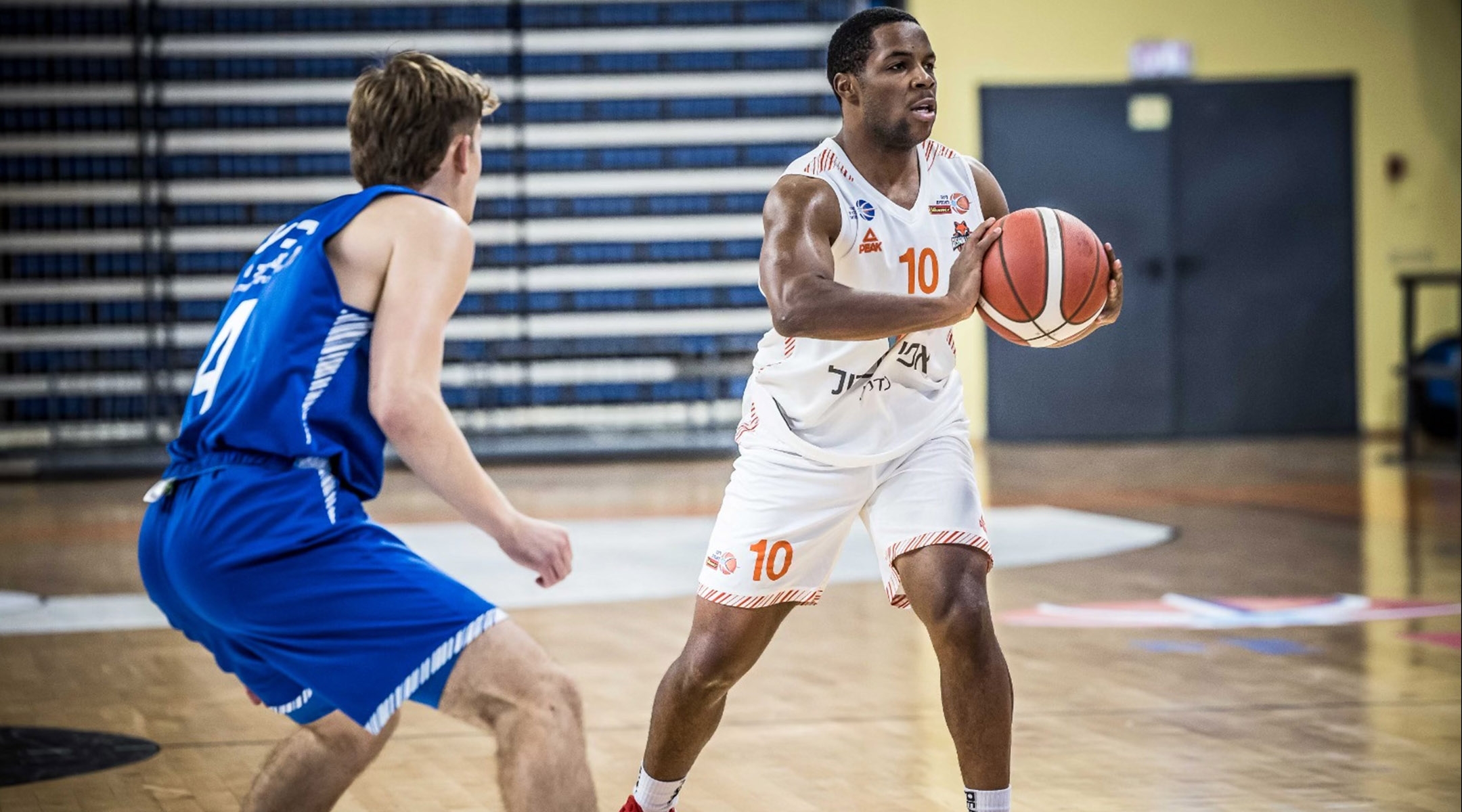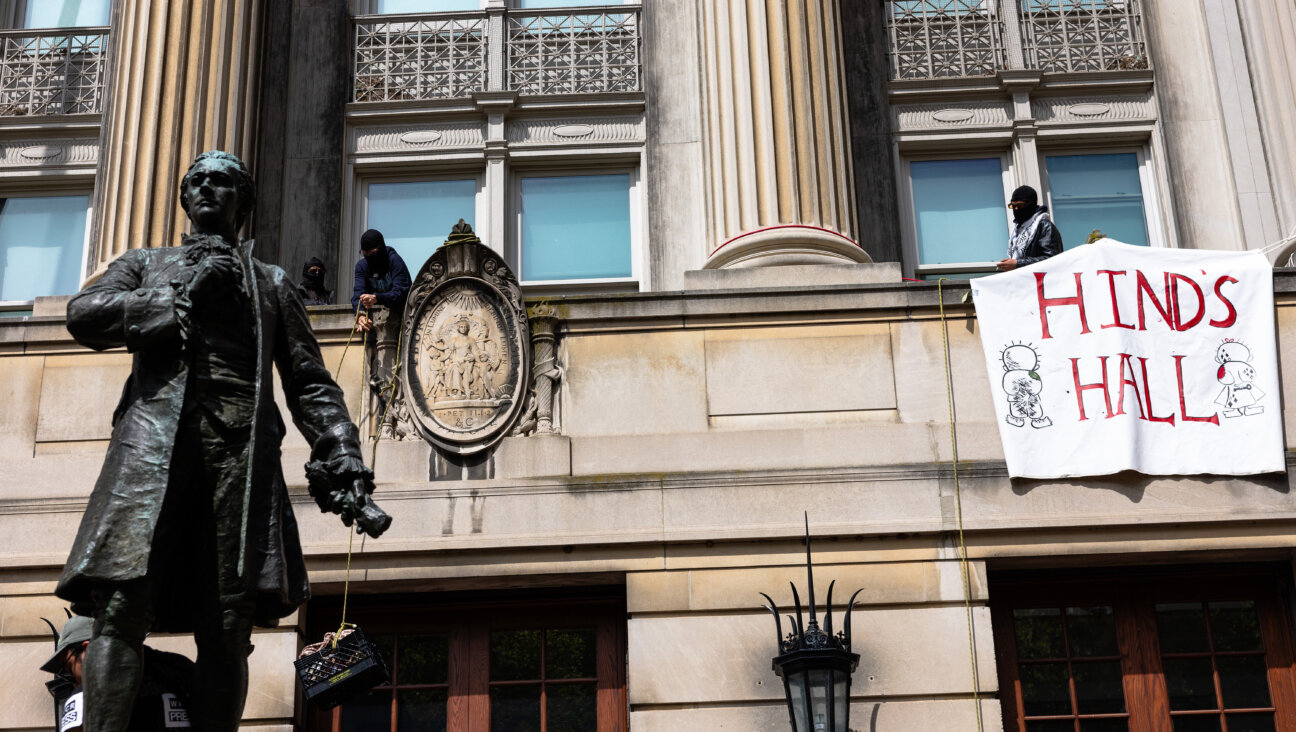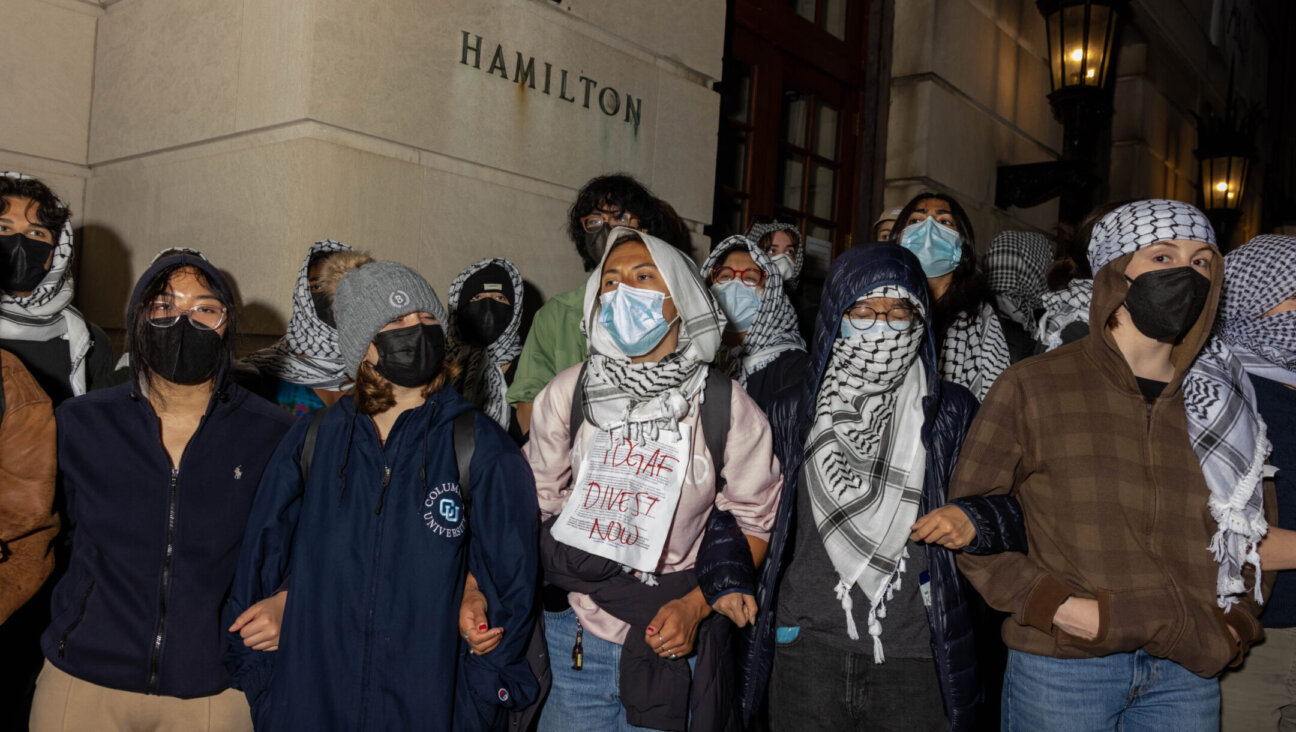Jared Armstrong, basketball player who fought for Israeli citizenship, is now working to promote Black-Jewish relations

Jared Armstrong, right, playing professional basketball in Israel. (Courtesy of Jared Armstrong)
(JTA) — Basketball player Jared Armstrong made headlines last year for his months-long effort to obtain Israeli citizenship. Armstrong, who was raised Jewish and completed a Conservative conversion to help his citizenship bid, was rejected multiple times before being granted temporary residence last May. The case drew attention from prominent Jewish leaders and drew accusations of racism.
It also cost him a spot on Hapoel Haifa, a team in Israel’s top basketball league, he told the Jewish Telegraphic Agency. The team voided his contract because he didn’t receive citizenship in time.
But this weekend, before returning to play hoops in Israel’s second-tier league, Armstrong is putting the drama aside to focus on something else he is passionate about: strengthening the relationship between the Jewish and Black communities.
On Sunday, Armstrong is running a free basketball clinic for sixth, seventh and eighth graders in Philadelphia. If all goes well, he hopes to start a two-week summer camp next year to continue this work.
“With a rich history of Black and Jewish relations, and kind of where we’re at in society, it’s only right that we come closer together,” Armstrong said. “I thought it would be great to do that starting from the youngest age and up.”
The controversies and accusations of antisemitism surrounding rapper Kanye West and NBA star Kyrie Irving last year led to increased calls for collaboration between the Black and Jewish communities, from members of Congress to other prominent sports leaders like New England Patriots owner Robert Kraft.
Armstrong said 28 kids have signed up for his clinic, including both Jewish and Black athletes, with some attendees coming in from as far as Connecticut. His goal is to use sports as a vehicle for combating antisemitism and racism, and he hopes that as many as 80 sign up for a camp next year.
“I think at a young age, most kids have a passion for something they love,” Armstrong said. “Sports are normally the first thing they fall in love with, and it’s a great way to build community, build lifelong relationships and learn a lot of life lessons.”
This weekend’s participants will hear from Eric Rubin, a veteran financial executive who is involved in several Jewish organizations aimed at using sports to combat hate.
Rubin is the managing director of Project Max, a collaboration between the Maccabi World Union sports umbrella and the Israeli AI company Sighteer. Its mission is to “fight racism, antisemitism, and intolerance through sports.” Armstrong sits on the group’s advisory board. Rubin is also a board member of Athletes for Israel, the organization that has organized Israel trips for a number of top U.S. collegiate basketball teams.
Armstrong said Rubin will speak to the participants about “the importance of community and being able to work with people that are different from you.” Attendees will also meet American former professional basketball player Bilal Benn, who has played in Israel.
Growing up in Severn, Maryland before moving to Philadelphia during middle school, Armstrong was raised Jewish by a mother whose conversion is not recognized by any of the major Jewish denominations. His own conversion was overseen by Rabbi Michael Beals, a Conservative rabbi in Delaware known for his close relationship with U.S. President Joe Biden. Beals has said that Israel’s rejection of Armstrong’s citizenship application was an “insult to the Conservative movement,” whose rabbis have struggled for recognition in a state where religious affairs are dominated by Orthodox rabbis.
At the same time Armstrong’s case was denied by Israel’s Interior Ministry last year, Portuguese soccer player Miguel Vitor was granted citizenship to play soccer in Israel. Israeli media questioned why Vitor received preferential treatment while Armstrong saw his case drag on with no resolution.
At the end of the month, Armstrong, who played Division II basketball at Slippery Rock University in Pennsylvania, is headed back to Israel to join Elitzur Ironi Ashkelon, a team in Liga Leumit, or National League, Israel’s second tier of professional basketball. Last year, he ultimately played for Maccabi Rishon LeZion, which is also in Liga Leumit. The season begins in October.
“I have lifelong friends that I’ve made in Israel, not only through my case, but outside of my case and through playing basketball,” Armstrong said. “I love the country as a whole. I love being there. I love the experience. It’s my second home.”
Armstrong said he hasn’t faced any racism in Israel, but rather what he called ignorance from those who question his Jewishness based on the color of his skin.
“I think there’s just a lack of information that I see not only Israel, [but] in the American community as well,” Armstrong said. “That needs to change.”
Beals told JTA that he and Armstrong are still in touch throughout the year, especially when Armstrong is in the U.S.
“I only have great things to say about Jared Armstrong — his persistence, his vision, his ability to turn lemonade from lemons,” Beals said.
Beals praised Armstrong for staying the course through his citizenship fight. “Other people would’ve given up, but he had a bigger picture of what he wanted to achieve,” Beals said.
“He really personifies everything I would hope for in a human being,” Beals added.
This article originally appeared on JTA.org.

I hope you appreciated this article. Before you go, I’d like to ask you to please support the Forward’s award-winning, nonprofit journalism during this critical time.
Now more than ever, American Jews need independent news they can trust, with reporting driven by truth, not ideology. We serve you, not any ideological agenda.
At a time when other newsrooms are closing or cutting back, the Forward has removed its paywall and invested additional resources to report on the ground from Israel and around the U.S. on the impact of the war, rising antisemitism and the protests on college campuses.
Readers like you make it all possible. Support our work by becoming a Forward Member and connect with our journalism and your community.
Make a gift of any size and become a Forward member today. You’ll support our mission to tell the American Jewish story fully and fairly.
— Rachel Fishman Feddersen, Publisher and CEO
Join our mission to tell the Jewish story fully and fairly.






















